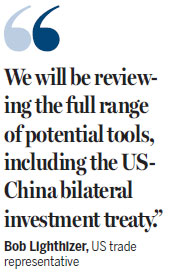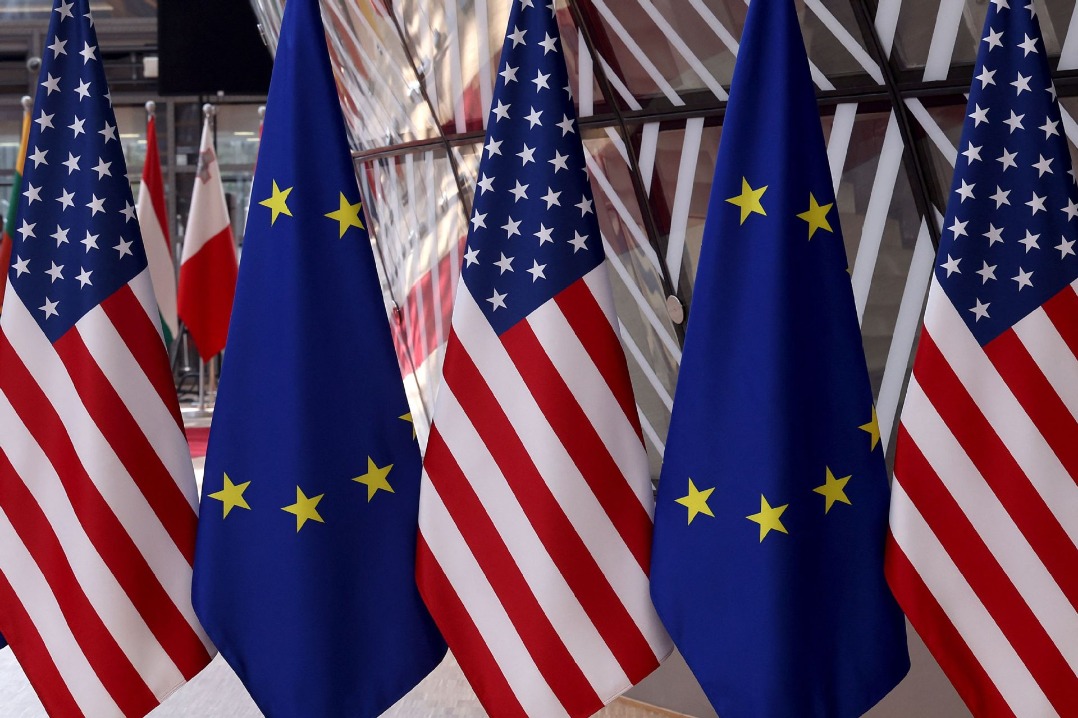Hope still alive for China-US treaty

Despite US President Donald Trump's lambasting of a variety of trade deals, experts believe that a Bilateral Investment Treaty (BIT) between China and the United States could still be concluded in the coming years.
China and the US accelerated BIT negotiations in the last two years of the Obama administration but still fell short of reaching an agreement.
Colin Grabow, a policy analyst at Washington-based Cato Institute, said the good news was that US Trade Representative Bob Lighthizer has not shut the door on the BIT, but indicated that there were still some issues to clear up before moving on to a BIT.
"So they can move on these issues maybe the US and China can get the BIT done by the end of Trump's four years," Grabow told China Daily ahead of Trump's trip to Asia. "That would be nice to see."
| Workers install wiring in an electric bus at a BYD factory in Lancaster, California, in September 2016. Zhang Chaoqun / Xinhua |
Asked at his confirmation hearing in March whether the Trump administration would pursue negotiations with China for a BIT, Lighthizer said the Trump administration places a high priority on utilizing a broad range of tools to ensure that China treats the US, its exports and companies fairly with respect to trade and investment.
"We will be reviewing the full range of potential tools, including the US-China bilateral investment treaty negotiation, to assess the best path for the administration to achieve this objective," he said.
US Treasury Secretary Steven Mnuchin told the US-China Business Council (USCBC) in June that a BIT with China is on the Trump administration's agenda, even though it isn't a top priority.
The Trump administration, after withdrawing from the Trans-Pacific Partnership (TPP), has been busy renegotiating the North American Free Trade Agreement (NAFTA) and the US-Korea Free Trade Agreement, known as KORUS, as well as re-examining other trade deals that Trump described as "horrible" or a "disaster".
Mireya Solis, David Dollar and Jonathan Stromseth of the Brookings Institution noted in an Asia economic policy paper for Trump's trip that it would not be easy to reach a BIT with China, but continuing the negotiations was important.
In past years, the USCBC, which represents more than 200 US companies doing business in China, has called on both the Obama and the Trump administrations to conclude a BIT with China.
A BIT would provide protection for both countries' foreign investment. While US companies would gain greater access to the Chinese market, especially in the services sector, the growing number of Chinese investors would also enjoy fair treatment in the US.
According to a report by New York-based Rhodium Group and the National Committee on US-China Relations, the annual growth of Chinese foreign direct investment (FDI) in the US averaged 32 percent from 2010 to 2015. In 2016, it jumped to $46 billion, a 200 percent increase from the previous record in 2015.
The report shows that Chinese-owned companies directly employ 141,000 American workers. The numbers for indirect employment are estimated in the tens of thousands.
US governors and mayors have shown great enthusiasm for wooing Chinese investors. But politicians in Washington often politicize Chinese FDI.
In a press briefing on Oct 30 on Trump's trip to China, Chinese Ambassador to the US Cui Tiankai complained that the US often uses unspecified national security as an excuse to block Chinese investment. "Is this going from opening up towards going backward?" he asked.
Cui's concerns are widely shared. Daniel Rosen and Thilo Hanemann of the Rhodium Group, which monitors Chinese FDI in the US, wrote in a report on Nov 3 that deal risk is magnified by the complex political mix that has been stirred up in Washington.

The report said businesses are reporting with increasing frustration that the national security reviews at the Committee on Foreign Investment in the United States (CFIUS), an interagency panel that reviews the national security implications of foreign investments, are taking much longer than before, with the greatest impact on Chinese investors.
Meanwhile, the US Congress is considering new legislation to increase CFIUS scrutiny and expand its scope, in response to perceived security risks related to Chinese high-tech investments.
Lawmakers leading this effort, including John Cornyn, a US senator from Texas, intend to introduce bills for debate in the coming weeks, according to the Rhodium report.
"The economic nationalists who shaped the messages which got Trump elected are highly allergic to Chinese FDI, no matter how private and low-tech," the report said.
In its annual report to Congress published in September, CFIUS said Chinese deals made up 29 percent of the 143 transactions it reviewed in 2015, the highest number among all nations.
On Sept 13, Trump issued an executive order blocking investment firm Canyon Bridge Capital, which involves Chinese investors, from acquiring US firm Lattice Semiconductor Corp out of concerns for national security.
The case marked the fourth time in 30 years that a US president has blocked a transaction out of national security concerns. All four cases have involved Chinese investors.
Rosen and Thiloman of Rhodium said that in their upcoming meetings, Trump and Xi could help clear up some of the uncertainties and re-establish a positive momentum for two-way FDI flow.
"Chinese FDI should be welcomed," said Grabow. "There is legitimate national concern, but unfortunately in this country, we also have a history of using national security as a cover for protectionism."
chenweihua@chinadailyusa.com
(China Daily USA 11/07/2017 page3)
Today's Top News
- Disrupting market under fabricated veneer of 'national security' hurts US' own interest: China Daily editorial
- Yasukuni visit would add insult to injury: China Daily editorial
- Judicial reform critical for modernizing governance
- Effective use of investment emphasized
- China's shuttle diplomacy strives to reach ceasefire
- Nanjing Museum's handling of donated art, relics being probed































